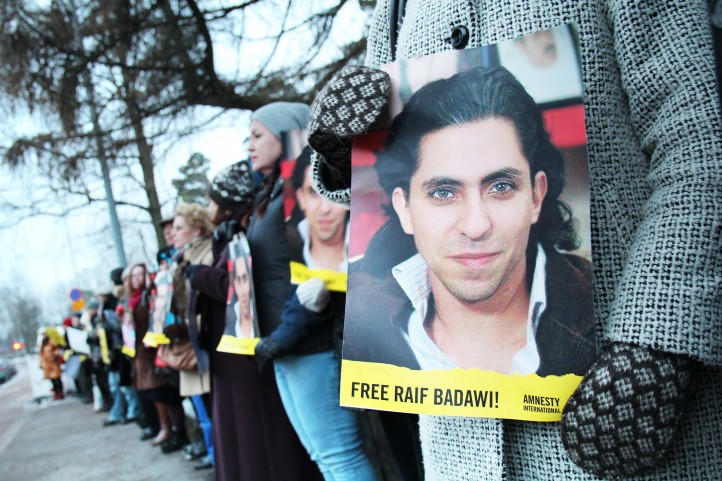by MAIKEL NABIL SANAD
 Demonstration outside the Saudi embassy in Helsinki, Finland on behalf of Raif Badawi PHOTO/Amnesty Finland via Flickr
Demonstration outside the Saudi embassy in Helsinki, Finland on behalf of Raif Badawi PHOTO/Amnesty Finland via Flickr
Some countries like Iceland are getting rid of outdated blasphemy laws, while other countries like Saudi Arabia are increasing their persecutions under such laws
Two weeks ago, Iceland abolished its 75-year-old blasphemy law. The parliament’s decision was a victory for the unconventional Pirate Party, which made the call to abolish the blasphemy law in Iceland after the Charlie Hebdo terrorist attacks in France. Churches in Iceland publically opposed this step, but this didn’t prevent the bill from gaining a vast majority in the Icelandic parliament.
One month before, on June 7, Saudi Arabia’s supreme courts decided to uphold the sentence of 1,000 lashes and 10 years imprisonment on the Saudi activist Raif Badawi. Raif, the founder of the Saudi Liberal network, was originally detained in June 2012 on charges of blasphemy and apostasy. So far Badawi has served three years of his sentence and already received 50 lashes last January. His courageous wife Ensaf Haidar has initiated a huge campaign on his behalf. Raif was also nominated for the Nobel Peace Prize because of his contribution to freedom in Saudi Arabia. But it seems that all of that is not enough to get him released.
Saudi Arabia isn’t the only country that targets blasphemers and nonbelievers. According to a report published by the Pew Research Institute in 2012, one out of every five countries has anti-blasphemy laws or policies, and one of every 10 countries penalizes apostasy.
Both the Icelandic and the Saudi decisions show contrasting approaches to dealing with blasphemy these days. Countries like Netherlands, Norway, and Iceland are getting rid of their old blasphemy laws. Other countries, like Ireland, are introducing new blasphemy laws. And countries like Saudi Arabia and Egypt are increasing their persecution of blasphemers.
The Saudi Hell
Saudi Arabia is the last place an atheist or a blasphemer would like to be in. Not only is atheism classified as an act of terrorism and apostasy and blasphemy are punishable by death, but also because physical punishment is legal in Saudi Arabia. A blasphemer can be tortured and lashed for years before he is handed to the executioner.
Saudi Arabia’s legal system is based on Sharia law, which is basically the instructions of the Quran, Hadith, and some other historic Islamic sources. But the main difference between Saudi Arabia and other Islamic countries that apply Sharia law is that Saudi Arabia doesn’t have written laws that define Sharia but leaves it to policemen and judges to interpret and implement the historic Islamic texts. And since the prophet of Islam, Mohamed, had ordered “You shall kill whoever changes his religion, Saudi judges would consider blasphemy an act of apostasy and punish blasphemers by death.
Last April, the former Saudi king Abdullah issued a new decree criminalizing activities considered hostile to the kingdom and now defined as acts of terrorism. The Saudi Interior Ministry followed with a list of groups criminalized by this decree, and atheists were among those groups. The irony here is that terrorism is now punished in Saudi Arabia, according to the new decree, with 20 years imprisonment, while apostasy and blasphemy are punishable by death. But as atheists are considered terrorists as well, they will be punished under both laws.
Raif Badawi isn’t the only one whom Saudi Arabia punished for blasphemy and apostasy. The kingdom has a long list of victims, and it’s hard to know most of the names in the list because of the country’s lack of transparency and efficient civil society. The Saudi Blogger Hamza Kashgari was hunted down in Malaysia, deported to Saudi Arabia, charged with blasphemy because of his anti-religious writings, and kept in prison for 20 months until he recanted his apostasy. The first act Kashgary did after being released was publishing a picture of him together with an Imam, receiving a gift of a copy of the Quran.
Foreign Policy in Focus for more
